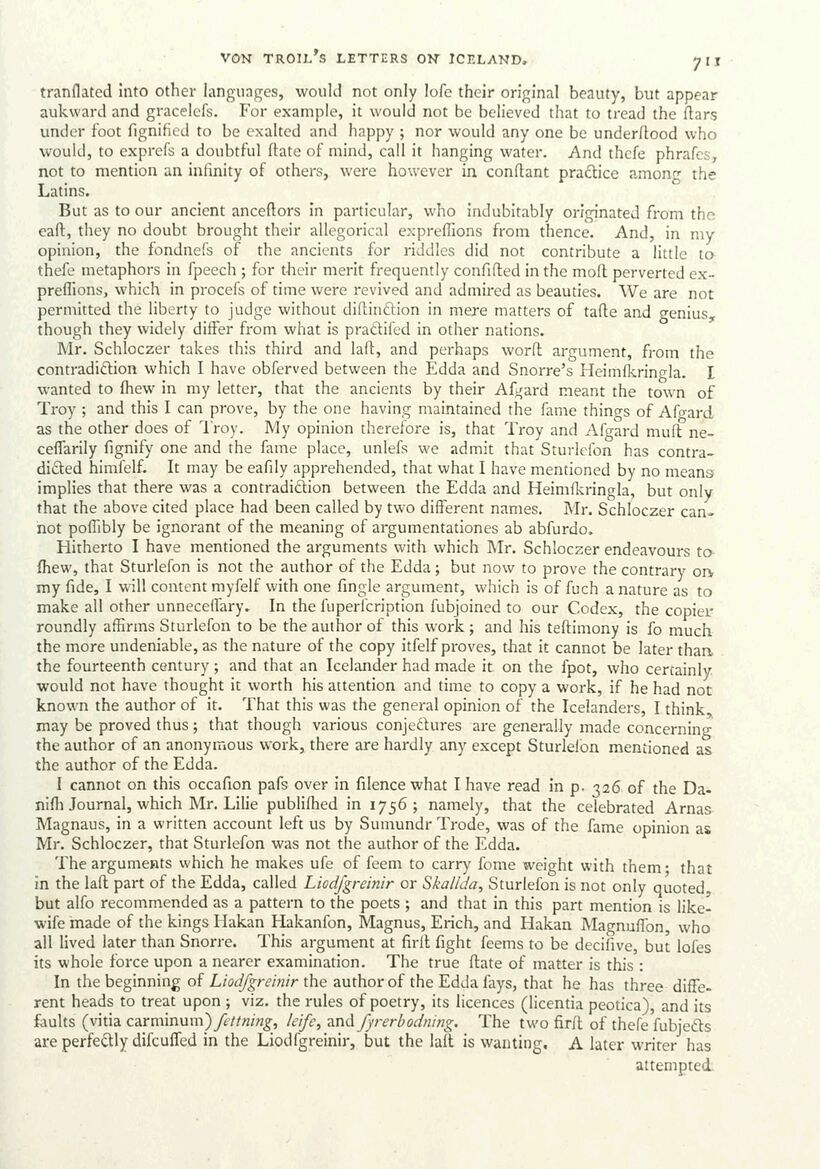
Full resolution (JPEG) - On this page / på denna sida - Pages ...

<< prev. page << föreg. sida << >> nästa sida >> next page >>
Below is the raw OCR text
from the above scanned image.
Do you see an error? Proofread the page now!
Här nedan syns maskintolkade texten från faksimilbilden ovan.
Ser du något fel? Korrekturläs sidan nu!
This page has never been proofread. / Denna sida har aldrig korrekturlästs.
VON TROIL’S LETTERS ON ICELAND, aX
tranflated into other languages, would not only lofe their original beauty, but appear
aukward and gracelefs. For example, it would not be believed that to tread the ftars
under foot fignified to be exalted and happy ; nor would any one be underftood who
would, to exprefs a doubtful {tate of mind, call it hanging water. And thefe phrafes,
not to mention an infinity of others, were however in conftant practice among the
Latins.
But as to our ancient anceftors in particular, who indubitably originated from the
eaft, they no doubt brought their allegorical expreflions from thence. And, in my
opinion, the fondnefs of the ancients for riddles did not contribute a little to
thefe metaphors in {peech ; for their merit frequently confifted in the moft perverted ex-
preflions, which in procefs of time were revived and admired as beauties. We are not
permitted the liberty to judge without diftinction in mere matters of tafte and genius,
though they widely differ from what is practifed in other nations.
Mr. Schloczer takes this third and laft, and perhaps worft argument, from the
contradiction which I have obferved between the Edda and Snorre’s Heimfkringla. I
wanted to fhew in my letter, that the ancients by their Afyard meant the town of
Troy ; and this I can prove, by the one having maintained the fame things of Afgard
as the other does of ‘Troy. My opinion therefore is, that Troy and Afgard muft ne-
ceflarily fignify one and the fame place, unlefs we admit that Sturlefon has contra-
dicted himfelf. It may be eafily apprehended, that what I have mentioned by no means
implies that there was a contradiction between the Edda and Heimfkringla, but only
that the above cited place had been called by two different names. Mr. Schloczer can-
not poflibly be ignorant of the meaning of argumentationes ab abfurdo.
Hitherto I have mentioned the arguments with which Mr. Schloczer endeavours to.
fhew, that Sturlefon is not the author of the Edda; but now to prove the contrary on
my fide, I will content myfelf with one fingle argument, which is of fuch a nature as to
make all other unneceflary. In the fuperfcription fubjoined to our Codex, the copier
roundly affirms Sturlefon to be the author of this work ; and his teftimony is fo much
the more undeniable, as the nature of the copy itfelf proves, that it cannot be later than
the fourteenth century ; and that an Icelander had made it on the fpot, who certainly.
would not have thought it worth his attention and time to copy a work, if he had not
known the author of it. That this was the general opinion of the Icelanders, I think,
may be proved thus; that though various conjectures are generally made concerning
the author of an anonymous work, there are hardly any except Sturlefon mentioned as
the author of the Edda.
I cannot on this occafion pafs over in filence what I have read in p- 326. of the Das
nifh Journal, which Mr. Lilie publifhed in 1756; namely, that the celebrated Arnas
Magnaus, in a written account left us by Sumundr Trode, was of the fame opinion as
Mr. Schloczer, that Sturlefon was not the author of the Edda.
‘The arguments which he makes ufe of feem to carry fome weight with them; that
in the laft part of the Edda, called Liod/greinir or Skalida, Sturlefon is not only quoted,
but alfo recommended as a pattern to the poets; and that in this part mention is like-
wife made of the kings Hakan Hakanfon, Magnus, Erich, and Hakan Magnuffon, who
all lived later than Snorre. This argument at firlt fight feems to be decifive, but lofes
its whole force upon a nearer examination. ‘The true ftate of matter is this :
In the beginning of Liod/greinir the author of the Edda fays, that he has three. diffe.
rent heads to treat upon; viz. the rules of poetry, its licences (licentia peotica), and its
faults (vitia carminum) /eftning, leife, and /yrerbodning. ‘The two firft of thefe fubjects
are perfectly difcuffed in the Liodfgreinir, but the laft is wanting. A later writer has
attempted
<< prev. page << föreg. sida << >> nästa sida >> next page >>